Sacred (religious).

Sacred means revered due to sanctity and is generally the state of being perceived by religious individuals as associated with divinity and considered worthy of spiritual respect or devotion; or inspiring awe or reverence among believers.
From an anthropological or atheistic perspective, the religious view of the sacred is an emic perspective on a culture's collection of thoughts and practices that function as a basis for the community's social structure.
Objects are often considered sacred if used for spiritual purposes, such as the worship or service of gods. The property is often ascribed to objects (a "sacred artifact" that is venerated and blessed), or places ("sacred ground").
The Twelve Days Of Christmas (song).
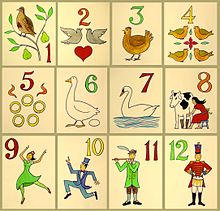
"The Twelve Days of Christmas" is an English Christmas carol that enumerates in the manner of a cumulative song a series of increasingly grand gifts given on each of the twelve days of Christmas (the twelve days that comprise the Christmas season starting with Christmas Day).[1][2] The song, published in England in 1780 without music as a chant or rhyme, is thought to be French in origin.[3] "The Twelve Days of Christmas" has a Roud Folk Song Index number of 68. The tunes of collected versions vary. The standard tune now associated with it is derived from a 1909 arrangement of a traditional folk melody by English composer Frederic Austin, who first introduced the now familiar prolongation of the verse "five gold rings".
John Denver & The Muppets- 12 days of Christmas.
Auld Lang Syne.

"Auld Lang Syne" (Scots pronunciation: [ˈɔːl(d) lɑŋˈsəin]: note "s" rather than "z")[1] is a Scots poem written by Robert Burns in 1788[2][3] and set to the tune of a traditional folk song (Roud # 6294). It is well known in many countries, especially in the English-speaking world, its traditional use being to bid farewell to the old year at the stroke of midnight. By extension, it is also sung at funerals, graduations and as a farewell or ending to other occasions. The international Boy Scout youth movement, in many countries, uses it to close jamborees and other functions.
Auld Lang Syne.
Robert Burns.
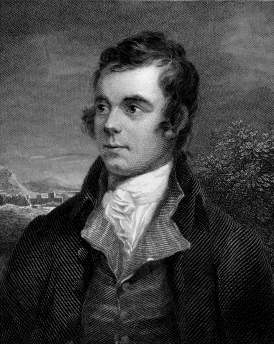
Robert Burns (25 January 1759 – 21 July 1796), also known as Rabbie Burns, the Bard of Ayrshire, Ploughman Poet and various other names and epithets,[nb 1] was a Scottish poet and lyricist. He is widely regarded as the national poet of Scotland and is celebrated worldwide. He is the best known of the poets who have written in the Scots language, although much of his writing is also in English and a light Scots dialect, accessible to an audience beyond Scotland. He also wrote in standard English, and in these writings his political or civil commentary is often at its bluntest.
Cain & Abel.

In Abrahamic religions, Cain and Abel (Hebrew: הֶבֶל ,קַיִן Qayin, Heḇel; Arabic: قابيل، هابيل Qābīl, Hābīl) were two of the sons of Adam and Eve.[1][2] They worked as food producers for their family; Cain was a crop farmer, and Abel was a shepherd. When they sacrificed to God, he favored Abel's sacrifice over Cain's. Later, Cain killed Abel, committing the first murder. God expelled Cain, but lightened his punishment after Cain complained that his original punishment was too difficult to bear. Cain was the first person born, and Abel was the first to die.
Beowulf.

Beowulf (/ˈbeɪoʊwʊlf, ˈbiːoʊ-/;[2] Old English: [ˈbeːo̯ˌwulf]) is an Old English epic poem consisting of 3182 alliterative lines. It may be the oldest surviving long poem in Old English and is commonly cited as one of the most important works of Old English literature. A date of composition is a matter of contention among scholars; the only certain dating pertains to the manuscript, which was produced between 975 and 1025.[3] The author was an anonymous Anglo-Saxon poet, referred to by scholars as the "Beowulf poet".
Beowulf & Grendel.

Beowulf & Grendel is a 2005 film Canadian-Icelandic fantasy adventure film directed by Sturla Gunnarsson, loosely based on the Anglo-Saxon epic poem Beowulf. It stars Gerard Butler as Beowulf, Stellan Skarsgård as Hrothgar, Ingvar Eggert Sigurðsson as Grendel and Sarah Polley as the witch Selma. The screenplay was written by Andrew Rai Berzins. The soundtrack was composed by Hilmar Örn Hilmarsson. While some of the film remains true to the original poem, other plot elements deviate from the original poem: three new characters, Grendel's father, the witch Selma, and Grendel's son are introduced, and several related plot points were developed specifically for the film.
The Canterbury Tales.

The Canterbury Tales (Middle English: Tales of Caunterbury[2]) is a collection of 24 stories that runs to over 17,000 lines written in Middle English by Geoffrey Chaucer. In 1386, Chaucer became Controller of Customs and Justice of Peace and, three years later, Clerk of the King's work in 1389. It was during these years that Chaucer began working on his most famous text, The Canterbury Tales. The tales (mostly written in verse, although some are in prose) are presented as part of a story-telling contest by a group of pilgrims as they travel together on a journey from London to Canterbury to visit the shrine of Saint Thomas Becket at Canterbury Cathedral. The prize for this contest is a free meal at the Tabard Inn at Southwark on their return.
Machiavelli.

Niccolò Machiavelli (Italian: [nikkoˈlɔ makjaˈvɛlli]; 3 May 1469 – 21 June 1527), or more formally Niccolò di Bernardo dei Machiavelli, was an Italian Renaissance historian, politician, diplomat, philosopher, humanist, and writer.[1] [2] He has often been called the founder of modern political science.[3] He was for many years a senior official in the Florentine Republic, with responsibilities in diplomatic and military affairs. He also wrote comedies, carnival songs, and poetry. His personal correspondence is renowned in the Italian language. He was secretary to the Second Chancery of the Republic of Florence from 1498 to 1512, when the Medici were out of power. He wrote his most renowned work The Prince (Il Principe) in 1513.
The Prince.

The Prince (Italian: Il Principe [il ˈprintʃipe]) is a 16th-century political treatise, by the Italian diplomat and political theorist, Niccolò Machiavelli. From correspondence a version appears to have been distributed in 1513, using a Latin title, De Principatibus (About Principalities). However, the printed version was not published until 1532, five years after Machiavelli's death. This was done with the permission of the Medici pope Clement VII, but "long before then, in fact since the first appearance of The Prince in manuscript, controversy had swirled about his writings".
Utopia.
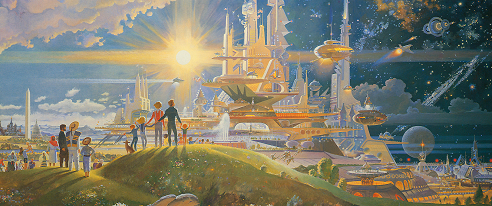
A utopia (/juːˈtoʊpiə/ yoo-toh-pee-ə) is an imagined community or society that possesses highly desirable or nearly perfect qualities.
Utopian ideals often place emphasis on egalitarian principles of equality in economics, government and justice, though by no means exclusively, with the method and structure of proposed implementation varying based on ideology. According to Lyman Tower Sargent "[t]here are socialist, capitalist, monarchical, democratic, anarchist, ecological, feminist, patriarchal, egalitarian, hierarchical, racist, left-wing, right-wing, reformist, free love, nuclear family, extended family, gay, lesbian, and many more utopias".[1]
The term has been used to describe intentional communities.
Dystopia.

A dystopia (from the Greek δυσ- and τόπος, alternatively, cacotopia,[1] kakotopia, or simply anti-utopia) is a community or society that is undesirable or frightening.[2][3] It is translated as "not-good place", an antonym of utopia, a term that was coined by Sir Thomas More and figures as the title of his most well-known work, Utopia (the blueprint for an ideal society with minimal crime, violence and poverty). Dystopian societies appear in many artistic works, particularly in stories set in the future. Some of the most famous examples are George Orwell's 1984 and Aldous Huxley's Brave New World. Dystopias are often characterized by dehumanization,[2] totalitarian governments, environmental disaster,[3] or other characteristics associated with a cataclysmic decline in society. Dystopian societies appear in many subgenres of fiction and are often used to draw attention to real-world issues regarding society, environment, politics, economics, religion, psychology, ethics, science, and/or technology. Some authors however also use the term to refer to actually-existing societies, many of which are or have been totalitarian polities, or societies in an advanced state of collapse and disintegration. An attempt to draw together and compare both the fictional and real dystopias has been made in Gregory Claeys's Dystopia: A Natural History (Oxford University Press, 2016).
Sir Thomas More.
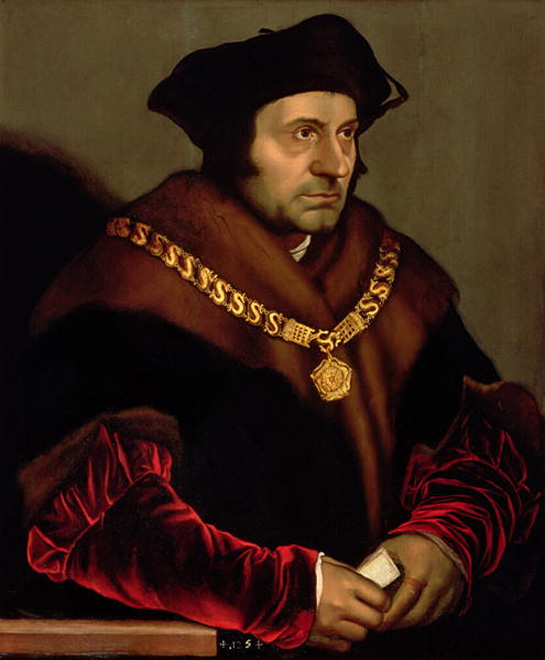
Sir Thomas More (/ˈmɔːr/; 7 February 1478 – 6 July 1535), venerated by Roman Catholics as Saint Thomas More,[1][2] was an English lawyer, social philosopher, author, statesman and noted Renaissance humanist. He was also a councillor to Henry VIII, and Lord High Chancellor of England from October 1529 to 16 May 1532.[3] He also wrote Utopia, published in 1516, about the political system of an imaginary ideal island nation.
Politician.

A politician (from Classical Greek πόλις, "polis") is a person active in party politics, or a person holding or seeking office in government. In democratic countries, politicians seek elective positions within a government through elections or, at times, temporary appointment to replace politicians who have died, resigned or have been otherwise removed from office. In non-democratic countries, they employ other means of reaching power through appointment, bribery, revolutions and intrigues. Some politicians are experienced in the art or science of government.[1] Politicians propose, support and create laws or policies that govern the land and, by extension, its people. Broadly speaking, a "politician" can be anyone who seeks to achieve political power in any bureaucratic institution.
Aldous Huxley.

Aldous Leonard Huxley (/ˈɔːldəs ˈhʌksli/; 26 July 1894 – 22 November 1963) was an English writer, novelist, philosopher,[1][2][3][4]and prominent member of the Huxley family. He graduated from Balliol College, Oxford, with a first in English literature.
He was best known for his novels including Brave New World, set in a dystopian London; for non-fiction books, such as The Doors of Perception, which recalls experiences when taking a psychedelic drug; and a wide-ranging output of essays. Early in his career Huxley edited the magazine Oxford Poetry and published short stories and poetry. Mid career and later, he published travel writing, film stories, and scripts. He spent the later part of his life in th U.S., living in Los Angeles from 1937 until his death. In 1962, a year before his death, he was elected Companion of Literature by the Royal Society of Literature.
Brave New World.

Brave New World is a novel written in 1931 by Aldous Huxley and published in 1932. Set in London in the year AD 2540 (632 A.F.—"After Ford"—in the book), the novel anticipates developments in reproductive technology, sleep-learning, psychological manipulation, and classical conditioning that combine profoundly to change society. Huxley answered this book with a reassessment in an essay, Brave New World Revisited (1958), and with Island (1962), his final novel.
In 1999, the Modern Library ranked Brave New World fifth on its list of the 100 best English-language novels of the 20th century.[2] In 2003, Robert McCrum writing for The Observer included Brave New World chronologically at number 53 in "the top 100 greatest novels of all time",[3] and the novel was listed at number 87 on the BBC's survey The Big Read.
Apocalypse.
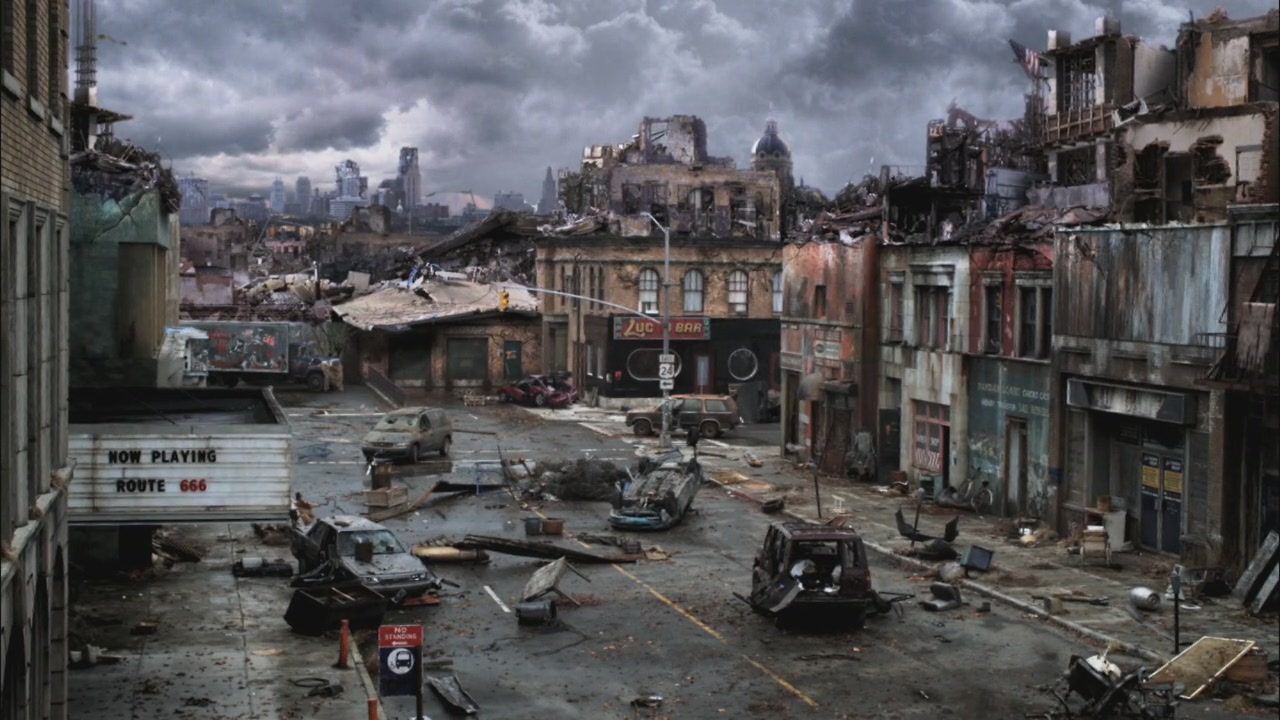
An apocalypse (Ancient Greek: ἀποκάλυψις apokálypsis, from ἀπό and καλύπτω, literally meaning "an uncovering") is a disclosure of knowledge or revelation. In religious contexts it is usually a disclosure of something hidden, “a vision of heavenly secrets that can make sense of earthly realities".[1]
In the Book of Revelation (Greek: Ἀποκάλυψις Ἰωάννου, Apokalypsis Ioannou – literally, John's Revelation), the last book of the New Testament, the revelation which John receives is that of the ultimate victory of good over evil and the end of the present age, and that is the primary meaning of the term, one that dates to 1175.
The Hunger Game (Film).

The Hunger Games is a 2012 American science fiction action film directed by Gary Ross and based on the novel of the same name by Suzanne Collins. It is the first installment in The Hunger Games film series and was produced by Nina Jacobson and Jon Kilik, with a screenplay by Ross, Collins, and Billy Ray. The film stars Jennifer Lawrence, Josh Hutcherson, Liam Hemsworth, Woody Harrelson, Elizabeth Banks, Lenny Kravitz, Stanley Tucci, and Donald Sutherland.[5] The story takes place in a dystopian post-apocalyptic future in the nation of Panem, where boys and girls between the ages of 12 and 18 must take part in the Hunger Games, a televised annual event in which the "tributes" are required to fight to the death until there is only one survivor. Katniss Everdeen (Lawrence) volunteers to take her younger sister's place. Joined by her district's male tribute, Peeta Mellark (Hutcherson), Katniss travels to the Capitol to train for the Hunger Games under the guidance of former victor Haymitch Abernathy (Harrelson).
Leaving Las Vegas.
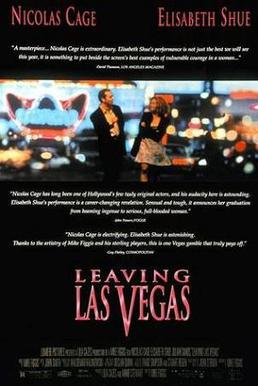
Leaving Las Vegas is a 1995 romantic drama film written and directed by Mike Figgis and based on the semi-autobiographical novel Leaving Las Vegas by John O'Brien. Nicolas Cage stars as a suicidal alcoholic who has ended his personal and professional life to drink himself to death in Las Vegas. While there, he develops a relationship with a hardened prostitute played by Elisabeth Shue, which forms the center of the film. O'Brien committed suicide two weeks after principal photography of the film began.
Hermes.

Hermes (/ˈhɜːrmiːz/; Greek: Ἑρμῆς) is an Olympian god in Greek religion and mythology, the son of Zeus and the Pleiad Maia, and the second youngest of the Olympian gods (Dionysus being the youngest).
Hermes is considered a god of transitions and boundaries. He is described as quick and cunning, moving freely between the worlds of the mortal and divine. He is also portrayed as an emissary and messenger of the gods;[1] an intercessor between mortals and the divine, and conductor of souls into the afterlife. He has been viewed as the protector and patron of herdsmen, thieves,[2] oratory and wit, literature and poetry, athletics and sports, invention and trade,[3] roads, boundaries and travelers.
Mount Rushmore.
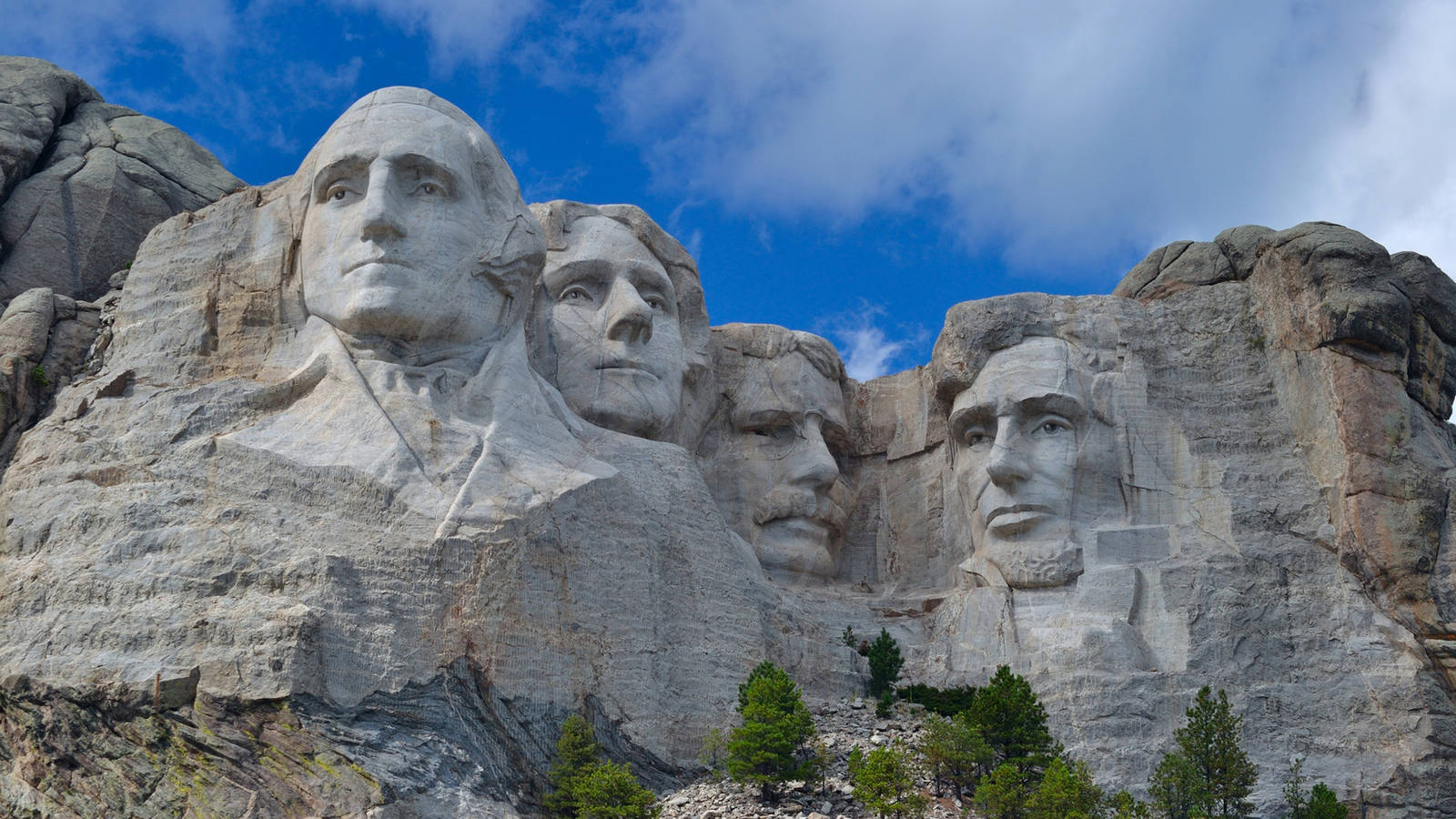
Mount Rushmore National Memorial is a sculpture carved into the granite face of Mount Rushmore, a granite batholith formation in the Black Hills in Keystone, South Dakota, United States. Sculpted by Gutzon Borglum and his son, Lincoln Borglum, Mount Rushmore features 60-foot (18 m) sculptures of the heads of four United States presidents: George Washington (1732–1799), Thomas Jefferson (1743–1826), Theodore Roosevelt (1858–1919), and Abraham Lincoln (1809–1865).[2] The entire memorial covers 1,278.45 acres (2.00 sq mi; 5.17 km2)[3] and is 5,725 feet (1,745 m) above sea level.
Theodore Roosevelt.

Theodore Roosevelt Jr. (/ˈroʊzəvɛlt/ roh-zə-velt;[a] October 27, 1858 – January 6, 1919) was an American statesman, author, explorer, soldier, naturalist, and reformer who served as the 26th President of the United States from 1901 to 1909. As a leader of the Republican Party during this time, he became a driving force for the Progressive Era in the United States in the early 20th century.
Vocabulary.
1. Maleficent.
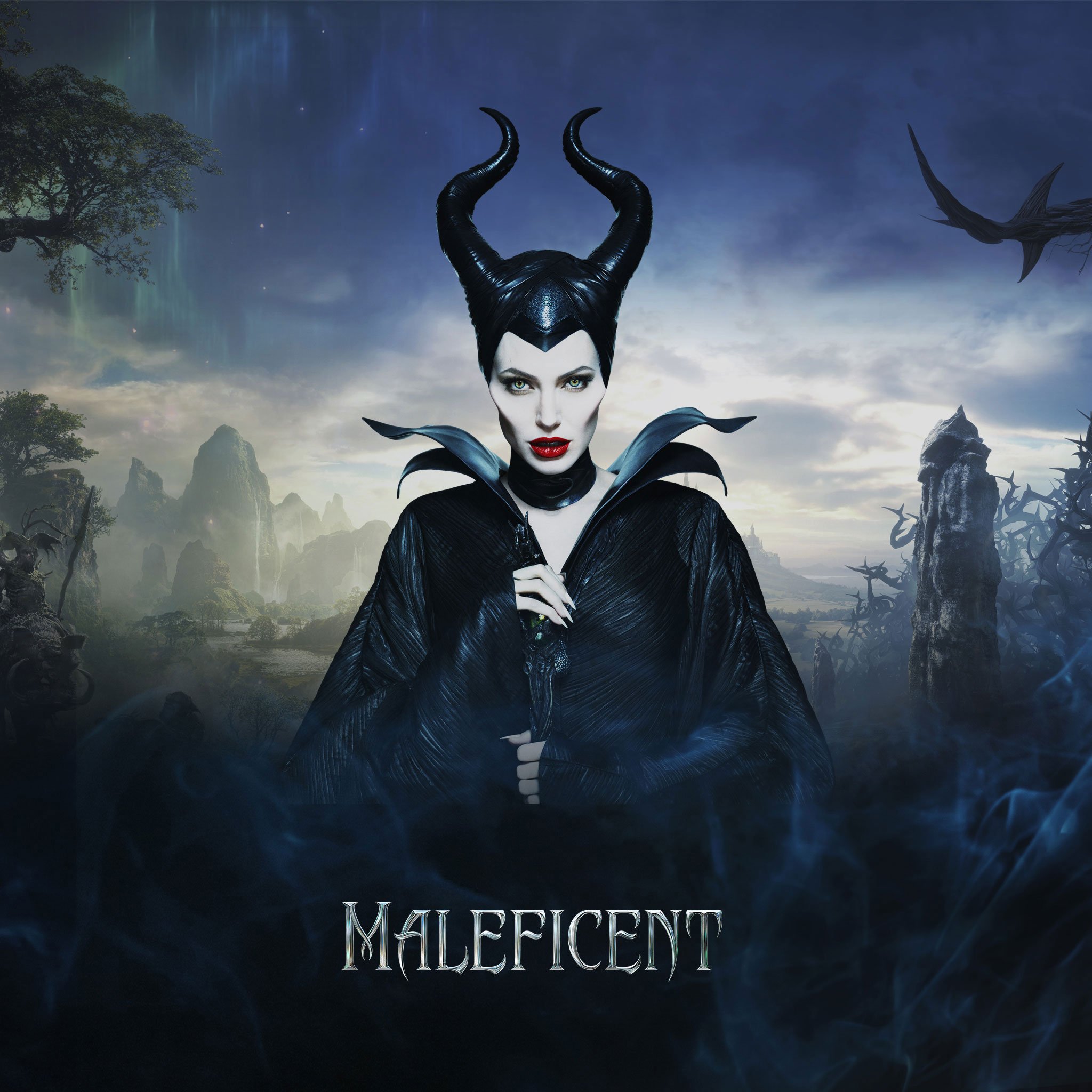
Pronunciation:
Definition: adjective
2. Villain.

Pronunciation:
Definition:
1. a wicked or malevolent person
2. (in a novel, play, film, etc) the main evil character and antagonist to the hero
Example
Sentences:
3. Quarantine.

Pronunciation:
Definition:
1. a period of isolation or detention, esp of persons or animals arriving from abroad, to prevent the spread of disease, usually consisting of the maximum known incubation period of the suspected disease
2. the place or area where such detention is enforced
4. Florist.
Pronunciation:
Definition:
Example
Sentences:
5. Cunning.

Pronunciation:
Definition:
Example
Sentences:
6. Vicious.
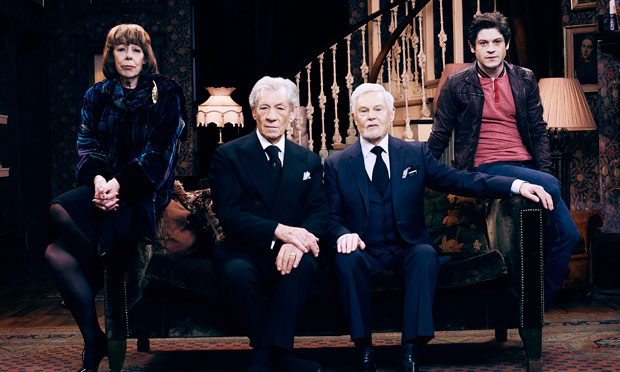
Pronunciation:
Definition:
1. wicked or cruel; villainous ⇒ a vicious thug
2. characterized by violence or ferocity
沒有留言:
張貼留言